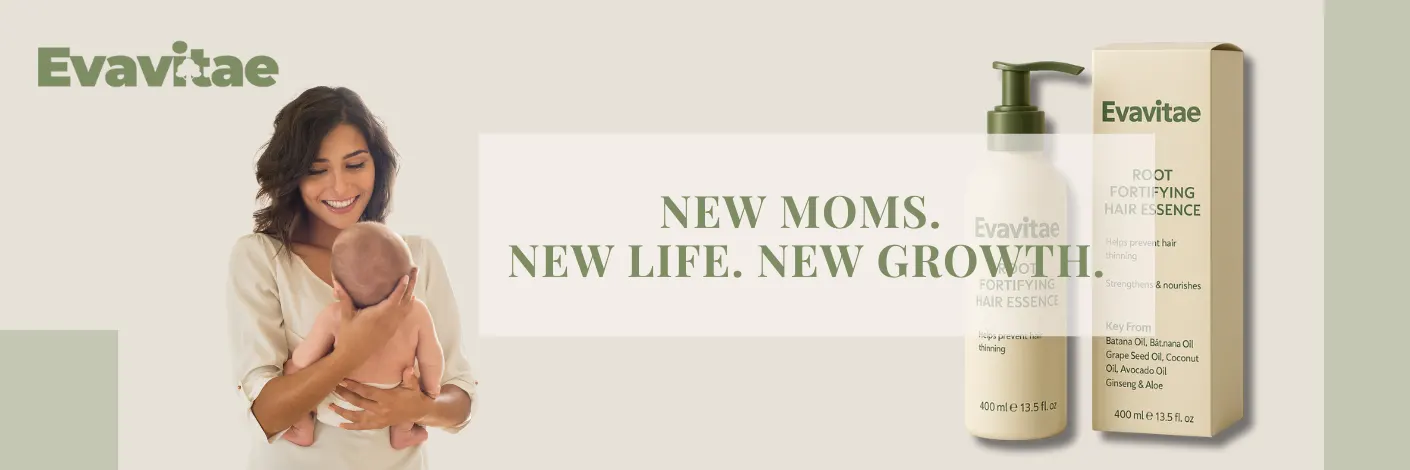
During pregnancy, elevated estrogen levels keep your hair in a prolonged growth phase, often resulting in thicker, fuller strands. However, after childbirth, this hormonal balance drops rapidly, and many hairs shift into the telogen (resting) phase, eventually leading to noticeable shedding—a condition known as postpartum telogen effluvium (Cleveland Clinic, 2023).
It’s estimated that 40%–50% of new mothers experience some degree of hair loss postpartum (Acquire Publications, 2022). While it’s temporary, it can feel unsettling—especially during a time when you’re already navigating major physical and emotional changes.
Hair changes often begin long before delivery. For expecting moms who want to keep their scalp healthy and prepare for postpartum recovery, take a look at our guide on pregnancy hair loss and gentle care tips for expecting and new moms.
👶 Why Does Postnatal Hair Loss Happen?
Here are the primary reasons behind the shedding:
- Hormonal Shift: After childbirth, estrogen levels fall, causing a larger number of hairs to enter the shedding phase (Cleveland Clinic, 2023).
- Physical and Emotional Stress: Recovery from labor, sleep deprivation, and the mental load of new motherhood can exacerbate shedding (Yousefian et al., 2022).
When shedding aligns with sleep debt, anxiety, or workload spikes, it’s often a sign of stress-triggered shedding after pregnancy. Here’s how to align your shampoo routine with recovery.
- Nutritional Gaps: A lack of iron, zinc, vitamin D, biotin, or protein can impact follicle strength and regrowth (AANMC, 2024).
- Underlying Conditions: Sometimes, postpartum shedding reveals preexisting hair loss conditions like genetic alopecia or thyroid imbalances.
🕒 How Long Does It Last?
Postpartum hair loss typically starts around 2–4 months after delivery, peaking at 3–6 months, and tapering off by 12 months postpartum. In some cases, it may persist up to 15 months.
Once you understand the timeline, the next step is aligning care inside and out. Here’s a practical guide to rebuilding hair health from the inside out after postpartum shedding, including how to choose a gentle shampoo routine.
If shedding continues beyond a year or worsens suddenly, it’s wise to consult a healthcare provider to rule out iron deficiency, thyroid dysfunction, or androgenetic alopecia.
Postpartum shedding is just one of many types of hair loss women may experience. To understand how it differs from other forms and what they look like, check out our overview of common hair loss types and their key characteristics.
🧴 Gentle Hair Care Tips for New Moms
🍽 Nourish From Within
- Include foods rich in iron, zinc, protein, omega-3 fatty acids, and vitamins A, C, D, E—like eggs, spinach, nuts, avocados, and lean meats.
- If dietary intake is inconsistent, talk to your doctor about postpartum-friendly supplements such as biotin or a multivitamin (AANMC, 2024).
💆♀️ Treat Your Scalp Kindly
- Use a volumizing shampoo(try Evavitae) and a lightweight conditioner, applied only to the ends—not the scalp (AAD, 2022).
- Avoid tight hairstyles (like ponytails) that tug on fragile hair.
- Reduce heat styling—opt for air drying, and use a wide-tooth comb on wet hair to minimize breakage.
- Massage your scalp with natural oils (e.g., coconut or castor oil) once or twice a week to stimulate blood flow.
🧘♀️ Protect Your Mental Wellness
- Stress is a common contributor to hair loss. If possible, share caregiving responsibilities and make time for restful breaks or gentle movement like stretching or postnatal yoga.
- Consider a new haircut—shorter, layered styles can create the illusion of thickness and make daily hair care easier.
✅ When to Seek Professional Help
Seek medical attention if:
- Hair loss lasts longer than 12 months
- You notice bald patches, itching, or scalp inflammation
- You have symptoms of fatigue, cold sensitivity, or low iron
These may indicate a condition such as telogen effluvium with underlying thyroid or hormonal disorders (Yousefian et al., 2022).
📌 Quick Recovery Checklist for New Moms
Strategy | Why It Helps | How to Start |
Eat nutrient-rich meals | Supports hair regrowth | Focus on leafy greens, protein, healthy fats |
Avoid tight styles & heat | Reduces follicle stress | Air dry hair; switch to loose buns or scarves |
Scalp massage | Boosts blood flow | Use coconut oil 1–2x/week for 5 mins |
Take breaks | Lowers stress-related shedding | Ask for help; even 15 mins matters |
Track changes | Ensures early intervention | See a dermatologist if excessive shedding persists |
🌸 Want to understand what drives hair loss—and how to restore balance? See the Hair Loss 101 Hub.
Learn how to restore healthy hair after pregnancy through the Postpartum Hair Care Hub.
📚 References
- American Academy of Dermatology Association. (2022). Hair loss in new moms. https://www.aad.org/public/diseases/hair-loss/insider/new-moms
- Cleveland Clinic. (2023). Postpartum Hair Loss: Causes, Treatment & What to Expect. https://my.clevelandclinic.org/health/diseases/23297-postpartum-hair-loss
- Yousefian, F., Yadlapati, S., & Krejci‑Manwaring, J. (2022). Postpartum alopecia. Journal of Case Reports and Medical History, 2(5). https://www.acquirepublications.org/Journal/CaseReports/Articles/JCRMH2200124
- AANMC. (2024, December 2). Natural Remedies for Postpartum Hair Loss. https://aanmc.org/natural-remedies/natural-remedies-for-postpartum-hair-loss/
Evavitae products are now available exclusively at www.evavitae.com.




Add comment
You must be logged in to post a comment.